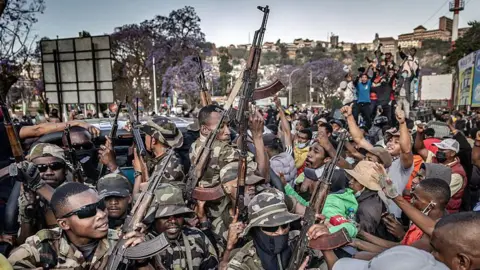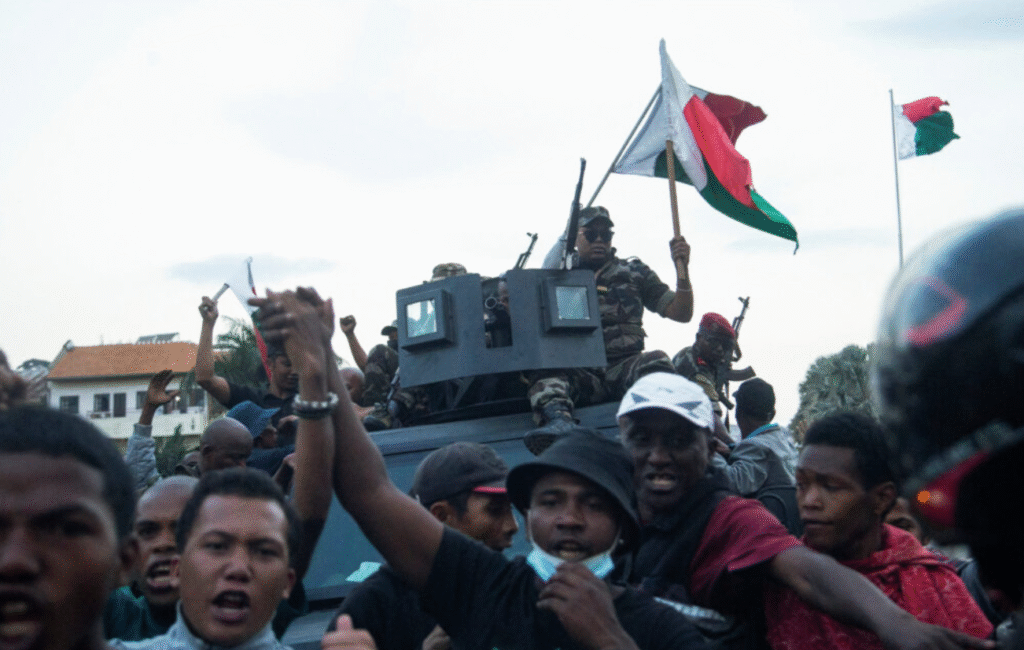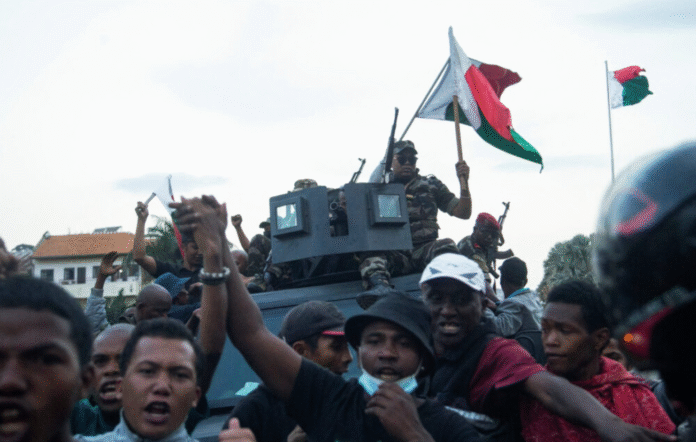Madagascar Military Seizes Power: A Nation in Celebration and Uncertainty
The Madagascar military seizes power in a stunning move that has completely reshaped the nation’s political landscape. After weeks of youth-led protests demanding answers over severe water shortages and daily power cuts, the country’s most powerful military unit has taken control from President Andry Rajoelina.
Crowds flooded the streets of the capital, Antananarivo, waving flags, chanting, and celebrating what many believe is the beginning of a long-awaited transformation. For the first time in years, the people of Madagascar are united by both relief and uncertainty, relief that their voices were heard, and uncertainty about what lies ahead.

How the Madagascar Military Seizes Power After Weeks of Protest
This dramatic political change did not happen overnight. The island nation had been experiencing growing frustration over the government’s failure to address worsening living conditions. Extended blackouts and water shortages crippled communities, forcing citizens to protest in the streets.
The movement was led primarily by Madagascar’s youth, who felt ignored and marginalized. As the demonstrations gained momentum, they exposed the deep cracks within the government’s ability to manage public services. When the Madagascar military seizes power, it became the breaking point of weeks of chaos and desperation.
The Power Behind the Takeover: Colonel Michael Randrianirina and CAPSAT
At the heart of this takeover stands Colonel Michael Randrianirina, chief of the Personnel Administration and Technical and Administrative Services Corps (CAPSAT) — Madagascar’s elite and most influential military unit.
Standing before journalists outside the presidential palace, Colonel Randrianirina declared that the military had “assumed national responsibility” and would form a transitional government to restore order. He announced that free elections would be held within two years, promising a fair democratic transition.
The colonel emphasized that the goal was not to impose military control but to return power to the people. His speech was met with applause from thousands gathered in the capital, marking a pivotal moment as the Madagascar military seizes power.
Where Is President Andry Rajoelina?
The fate of President Rajoelina remains uncertain. According to reports, he is in a “safe location” following what he described as an attempt on his life involving “certain military personnel and politicians.” CAPSAT has firmly denied involvement in any such attack, maintaining that their mission was lawful and aimed at national stability.
Despite the president’s absence, the transition appears to be unfolding peacefully so far. However, political analysts warn that the longer his whereabouts remain secret, the more speculation will grow about potential divisions within the armed forces themselves.
Madagascar Military Seizes Power: Public Joy and Fear Collide
When the Madagascar military seizes power, the public reaction is both emotional and complex. Across Antananarivo, cheers and music filled the streets. Young people waved banners reading “Justice for the People” and “We Want Change.” Fireworks lit up the skyline as the people celebrated what they saw as liberation from years of stagnation.
Yet, not everyone views the takeover as a victory. Human rights groups and democratic activists have expressed concern that a military-led transition might threaten civil liberties. Madagascar has experienced coups before, the last one in 2009 plunged the country into political isolation for years.
Many citizens are cautiously optimistic, hoping that this time will be different. As one resident put it, “If the military gives us light, water, and dignity, then they have our trust.”
The Next Chapter: What Happens After the Madagascar Military Seizes Power
Colonel Randrianirina’s commitment to holding elections within two years is now under global scrutiny. Whether those elections actually take place will determine the credibility of the new leadership. The military’s first tasks will be rebuilding infrastructure, restoring electricity, and securing public trust.
Experts say that the success of this new government will depend on how quickly it addresses the daily struggles of ordinary citizens. After years of frustration, people are desperate for real change, not empty promises.
For the moment, the Madagascar military seizes power, and the nation watches carefully to see if this bold move will lead to renewal or repeat the mistakes of the past.
A Divided Global Reaction
Reactions to the situation have been mixed. While some neighboring countries have urged restraint, others view the event as a natural outcome of public anger. International organizations are calling for calm and the restoration of democratic processes.
Inside Madagascar, there is a sense of national pride among supporters who believe that this change could finally break years of political gridlock. Opponents, however, fear that a military-run administration may delay genuine democratic reform.

Madagascar Military Seizes Power: What It Means for Africa
The fact that the Madagascar military seizes power echoes a growing pattern across the African continent, where dissatisfaction with political elites has fueled military interventions. Nations like Mali, Niger, and Guinea have experienced similar events in recent years.
Observers warn that such takeovers, while often celebrated at first, can have lasting economic and political consequences. Investors tend to withdraw, aid gets frozen, and the people’s hopes often fade when promised reforms fail to materialize.
The world will be watching closely to see whether Madagascar’s new leadership can break this cycle and deliver meaningful change.
The Road Ahead for Madagascar
The Madagascar military seizes power at a time when the country desperately needs direction. Economic instability, youth unemployment, and climate challenges have pushed millions into hardship. The coming months will test the army’s ability to govern responsibly and inclusively.
For many citizens, this is not just another coup, it’s a moment of reckoning. Whether it becomes a story of hope or history repeating itself will depend on how quickly and effectively the new government responds to the people’s needs.
Conclusion: Hope, Risk, and a Nation Reborn
As Madagascar stands at a historic crossroads, the air is filled with both celebration and apprehension. The Madagascar military seizes power, promising reform, unity, and progress. Yet, the echoes of the past remind everyone that power transitions are rarely simple.
For now, the people rejoice, the streets are alive with chants of freedom, and a new chapter begins. The coming days will reveal whether this is the rebirth of a nation, or the beginning of another uncertain era.

